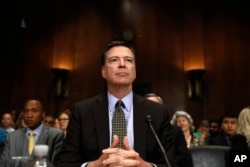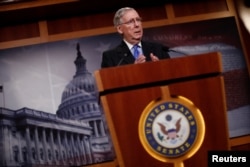More than a dozen Republican senators voiced concerns Wednesday over President Donald Trump's firing of FBI Director James Comey, in a series of statements suggesting the GOP was not yet prepared to close ranks behind its president. But most Republicans also refused to embrace Democratic calls for a special counsel and it was not clear their hand-wringing would result in any action.
"The timing of this and the reasoning for it doesn't make sense to me," said Sen. Richard Burr of North Carolina, chairman of the Senate Intelligence committee, which like the FBI is investigating Russian ties to the Trump campaign and meddling in the 2016 election. Burr said Comey's firing could complicate his investigation.
"I think we need to find out what's happened and why," said Sen. Shelley Moore Capito of West Virginia.
Sen. Marco Rubio of Florida said, "I do have questions about why he was dismissed at this time given his service and performance."
The unease expressed by key committee chairs and rank-and-file lawmakers alike came even as Senate Majority Leader Mitch McConnell, R-Ky., echoed White House talking points on the issue and tried to shut down talk of a special prosecutor to investigate Russia issues.
Speaking on the Senate floor, McConnell noted that Democrats themselves had repeatedly criticized Comey over his handling of the investigation into Hillary Clinton's email issues. And he said that with the FBI and Senate intelligence committee already investigating Russian interference, nothing further was needed.
"Today we will no doubt hear calls for a new investigation which could only serve to impede the current work being done," McConnell said. He remarked that Democrats had "consistently complained" about Comey, though he notably failed to reveal his own views on the firing.
House Speaker Paul Ryan, R-Wis., stood firmly behind Trump. Ryan said the president, members of both parties and top Justice Department officials had lost confidence in Comey, and said "it is entirely within the president's role and authority to relieve him." Ryan spoke on Fox News' "Special Report with Bret Baier."
But Utah Rep. Jason Chaffetz, chairman of the House Oversight and Government Reform Committee, called on the Justice Department's inspector general to examine the decision to dismiss Comey.
The firing came after Comey had requested more resources from Deputy Attorney General Rod Rosenstein for the Russia investigation, The Associated Press and other news outlets reported. The Justice Department disputed that report.
For their part, Democrats voiced outrage over the abrupt firing, suggesting Trump was trying to impede the FBI's probe into his own campaign's ties with Russia.
"We know Director Comey was leading an investigation in whether the Trump campaign colluded with the Russians — a serious offense. Were those investigations getting too close to home for the president?" Minority Leader Chuck Schumer of New York asked on the Senate floor. "What should happen now ... what must happen now ... is that Mr. Rosenstein appoints a special prosecutor to oversee this investigation."
Schumer tried various tactics to draw attention to his demand, including summoning all 48 members of the Senate Democratic caucus to gather on the Senate floor as the day began to listen to McConnell's opening remarks. Most of them showed up, but McConnell made use of the circumstance to lecture them about the failings of "Obamacare" and invite them to join GOP efforts to repeal and replace the law.
Democrats then convened a special caucus meeting and indicated they would attempt to delay committee hearings or in other ways slow down the business of the Senate to highlight their demands. Schumer requested that McConnell convene an all-senators briefing to hear directly from Rosenstein and Attorney General Jeff Sessions about the matter.
The administration's stated reason for the firing was that Trump had lost confidence in Comey, and administration officials pointed to a letter from Rosenstein harshly criticizing Comey's leadership of the Clinton email investigation.
That explanation left unanswered questions for a number of GOP senators. The reaction was notable given that most Republicans have risen to the president's defense in the past, or at least avoided critical commentary, on issues from the immigration travel ban to Trump's false claims that the Obama administration wiretapped Trump Tower.
This time around, GOP senators seemed more willing to voice concerns.
"It would have been easier to explain if the president had fired the FBI Director earlier when Sen. Schumer and other Democrats said they'd lost confidence in Mr. Comey," said Sen. Lamar Alexander of Tennessee, a senior Republican. He said that the Senate must ensure ``that the new FBI director is a person of unquestioned integrity.''
Confirmation of the next FBI director will require a simple majority vote in the Senate.
GOP Sen. Lisa Murkowski of Alaska said in a statement, "Whether or not you are a supporter of Mr. James Comey's actions as FBI Director, the timing of his firing — in the middle of an investigation into Russia's interference in our election — is serious cause for concern."








